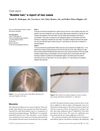 2 citations,
January 1998 in “Dermatology”
2 citations,
January 1998 in “Dermatology” Stopping forehead irritation and using hydrocortisone helped a man's skin, Martinique has lower melanoma rates, a man had an allergy to a specific antifungal, another had unexplained cysts, certain drugs can cause skin reactions without always being interrelated, a link between Fanconi anemia and a skin condition was suggested, high levels of a certain protein may play a role in a type of psoriasis, and there's a need to study the connection between scalp pain and hair loss.
 2 citations,
November 2014
2 citations,
November 2014 Common cosmetic dermatology techniques improve skin damaged by the sun and aging.
 2 citations,
October 2006 in “International Journal of Dermatology”
2 citations,
October 2006 in “International Journal of Dermatology” Excessive blow-drying can cause "bubble hair," leading to hair loss and fragility, but improves when heat use is reduced.
 1 citations,
July 2016 in “British Journal of Dermatology”
1 citations,
July 2016 in “British Journal of Dermatology” Men with a certain type of hair loss often use facial moisturizers, and a specific antibiotic treatment may help another hair condition.
 1 citations,
January 2014 in “Progress in Neurology and Psychiatry”
1 citations,
January 2014 in “Progress in Neurology and Psychiatry” Skin diseases can cause psychological issues, and better integration of dermatology and psychiatry is needed to improve patient care.
 1 citations,
October 2012 in “Elsevier eBooks”
1 citations,
October 2012 in “Elsevier eBooks” Skin stem cells can help improve skin repair and regeneration.
 1 citations,
January 2012 in “Elsevier eBooks”
1 citations,
January 2012 in “Elsevier eBooks” The document concludes that the skin is a complex organ providing protection, sensation, and healing, with challenges in treating conditions like itchiness.
 1 citations,
November 2011 in “Dermatologica Sinica”
1 citations,
November 2011 in “Dermatologica Sinica” Women using hair relaxers with alopecia had lower zinc levels, suggesting zinc deficiency might contribute to hair loss.
 1 citations,
April 2010 in “Expert Review of Dermatology”
1 citations,
April 2010 in “Expert Review of Dermatology” The document concludes that early diagnosis and treatment are crucial for managing rare hair loss disorders and that more research is needed to improve treatment strategies.
 1 citations,
February 2004
1 citations,
February 2004 Skin diseases are common and can significantly affect people's lives; better outcome measures and ethical clinical trials are needed to improve dermatology care.
 1 citations,
May 2002 in “British Journal of Dermatology”
1 citations,
May 2002 in “British Journal of Dermatology” Hair loss caused by longer latent hair cycle and sudden miniaturization, not gradual follicle size reduction.
 1 citations,
January 2017 in “International Journal of Dermoscopy”
1 citations,
January 2017 in “International Journal of Dermoscopy” Dermoscopy is useful for identifying and tracking different types of hair loss without scarring.
 April 2024 in “Frontiers in pharmacology”
April 2024 in “Frontiers in pharmacology” Cynoglossum amabile has medicinal potential but poses safety concerns due to liver toxicity.
 January 2024 in “Polski Merkuriusz Lekarski”
January 2024 in “Polski Merkuriusz Lekarski” Pica disorder in central Iraq is mainly found in females and is linked to low iron levels; treatment with iron improves most patients.
 October 2023 in “Journal of Medicine, University of Santo Tomas (JMUST Online)”
October 2023 in “Journal of Medicine, University of Santo Tomas (JMUST Online)” Elderly patients frequently suffer from skin conditions, especially inflammatory ones, highlighting the need for better healthcare.
 October 2023 in “Frontiers in endocrinology”
October 2023 in “Frontiers in endocrinology” Effective PCOS treatments require targeting specific signaling pathways.
 October 2023 in “Research Square (Research Square)”
October 2023 in “Research Square (Research Square)” Oxidative stress is linked to mild patchy alopecia areata.
 September 2023 in “Curēus”
September 2023 in “Curēus” Reproductive hormones play a crucial role in breast cancer development and treatment challenges.
 September 2023 in “Cureus”
September 2023 in “Cureus” Early recognition and treatment of atypical alopecia areata in infants are crucial.
 July 2023 in “The Egyptian Journal of Hospital Medicine ”
July 2023 in “The Egyptian Journal of Hospital Medicine ” Alopecia areata is a hair loss condition caused by immune factors and can be treated with JAK inhibitors.
 December 2022 in “Indian Journal of Animal Research”
December 2022 in “Indian Journal of Animal Research” Both fluoxetine and clomipramine effectively treat dog lick dermatitis, but fluoxetine works faster with lower recurrence, while clomipramine has fewer side effects.
 August 2022 in “Revista de la Universidad Industrial de Santander/Salud UIS”
August 2022 in “Revista de la Universidad Industrial de Santander/Salud UIS” Stress-related hair loss was reversed with a special medication.
 January 2020 in “Der Pharmacia Lettre”
January 2020 in “Der Pharmacia Lettre” Nanoparticle-based herbal remedies could be promising for treating hair loss with fewer side effects and lower cost, but more research is needed.

Accurate diagnosis and tailored treatments are crucial for managing hair loss in humans and animals.
 April 2019 in “The journal of investigative dermatology/Journal of investigative dermatology”
April 2019 in “The journal of investigative dermatology/Journal of investigative dermatology” Targeting cholesterol, fatty acids, fibrosis, and mast cells may help treat CCCA.
 April 2019 in “The journal of investigative dermatology/Journal of investigative dermatology”
April 2019 in “The journal of investigative dermatology/Journal of investigative dermatology” Keloids significantly reduce quality of life, and treating symptoms should be prioritized.
 January 2019 in “Springer eBooks”
January 2019 in “Springer eBooks” Some chemicals and drugs can cause hair loss, which usually grows back after stopping the treatment.
 July 2018 in “Elsevier eBooks”
July 2018 in “Elsevier eBooks” Lichen Planopilaris is a hair loss condition best treated early with various medications, including hydroxychloroquine, to prevent permanent baldness.

Alopecia Areata is treated with drugs and therapies to reduce inflammation and immune response.

Proper care and diet are crucial to prevent health issues in gerbils.





























